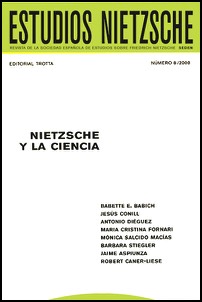«A problem with horns... the problem of science itself». Nietzsche’s Critique of Scientific Reason
DOI:
https://doi.org/10.24310/EstudiosNIETen.vi8.10279Keywords:
scientific rationality, critical project, art, life, ascetic idealAbstract
Nietzsche’s reflections on Science show the relevance of his thinking both for general Philosophy and for Philosophy of Science. His extreme challenge is not driven by reasons alien to Science, but for the sake of its own rationality and critical approach, insofar as Nietzsche’s challenge is nothing more than the radicalization of this critical project. However, because of the gap that always occurs in critical reflection, the project is possible only by placing one’s own perspective in a position external to Science, a place that for Nietzsche is provided by art. Only from the standpoint of art can we discover not only the theoretical meaning of Science to life, but also the practical one, insofar as it may be useful to us in order to question Techno-Science’s domination in our daily living.
Downloads
Metrics
References
Allison, David, Reading the New Nietzsche, Lanham, MD: Rowman & Littlefield, 2001. Rorty, R., «A Tale of Two Disciplines», en Callaloo 17/2 (1994), 575-585.
Alwin Mittasch, Alwin, Nietzsches Stellung zur Chemie, Berlin, 1944.
Ansell-Pearson, Keith, (edt.), A Companion to Nietzsche, Cambridge: Blackwell.
Babich, B. E., «Fleck’s Denkstil and Kuhn’s Paradigm: Conceptual schemes and Incommensurability»: International Studies in the Philosophy of Science 71 (2003), 75-92.
Babich, B. E., «Música y palabras en Nietzsche: Sobre la cuestión de la ciencia, el estilo y la música de la tragedia
griega Antigua» en Estudios Nietzsche 4 (2005), 11-35.
Babich, B.E., Nietzsche’s Philosophy of Science: Reflecting Science on the Ground of Art and Life, Albany: State University of New York Press, 1996.
Babich, B.E., «From Nietzsche’s Artist to Heidegger’s World: The Post-Aesthetic Perspective», en Man and World 22 (1989), 3-23.
Babich, B.E., «Heidegger’s Will to Power,» edición especial sobre Nietzsche en Journal of the British Society for Phenomenology 38/1 (2007), 37-60.
Babich, B.E., «The Genealogy of Morals and Right Reading: On the Nietzschean Aphorism and the Art of the Polemic», en Christa Davis Acampora (edt.), Nietzsche’s On the Genealogy of Morals, Lanham: Rowman & Littlefield, 2006, pp. 171-190.
Bennett, M. R y P. M. S. Hacker, Philosophical Foundations of Neuroscience, Cambridge: Blackwell Publishing, 2003.
Berkowitz, Roger, The Gift of Science, Cambridge: Harvard University, 2005.
Brix, H.J., N. Knoepffler, S. L. Sorgner (edts.), Wagner und Nietzsche. Kultur — Werk — Wirkung. Ein Handbuch, Reinbek b. Hamburg: Rowohlt, 2008.
Churchland, Paul, Neurophilosophy At Work, Cambridge: Cambridge University Press, 2007.
Hawking, S., A Brief History of Time, New York: Bantam Books, 1990.
Heidegger, Martin, Zollikon Seminars: Protocols — Conversations — Letters, Evanston: Northwestern University Press, 2001, p. 20.
Henke, Dieter, «Nietzsches Darwinismuskritik aus der Sicht gegenwärtiger Evolutionsforschung», en Nietzsche-Studien 13 (1984), 189-210.
Holton, The Scientific Imagination: Case Studies, Cambridge University Press, 1978, pp. 87-110.
Kahn, Charles, Dirk Couprie, Roberty Hahn, y Gerard Naddaf, Anaximander in Context: New Studies in the Origins of Greek Philosophy, Albany: State University of New York Press, 2003.
Kusch, Martin, Psychologism: A Case Study in the Sociology of Knowledge, London: Routledge, 1995.
MacIntyre, Alasdair en B. E. Babich (edt.), Nietzsche, Epistemology, Theories of Knowledge, cit., pp. x-xii.
Moore, Gregory y Thomas Brobjer (edts.), Nietzsche and the Sciences, Aldershot: Ashgate, 2004.
Moore, Gregory, Nietzsche, Biology and Metaphor, Cambridge University Press, 2002.
Nehamas, Alexander, Only a Promise of Happiness, Princeton; Princeton University Press, 2007.
Nietzsche, F., Obras Completas, I-IV (OC ). Director ed. Diego Sánchez Meca. Madrid: Tecnos, 2011-2016
Nietzsche, F., Correspondencia I-VI. (CO). Director ed. Luis E. de Santiago Guervós. Madrid : Trotta, 2005- 2012.
Nietzsche, F., Fragmentos Póstumos I-IV (FP). Director ed. Diego Sánchez Meca. Madrid: Tecnos, 2006-2010.
Onfray, Michel, Le ventre des philosophes, Paris: Grasset et Fasquelle, 1989.
Richardson, John, Nietzsche’s New Darwinism, Oxford: Oxford University Press, 2004.
Robert C. Holub’s, Robert, «The Birth of Psychoanalysis from the Spirit of Enmity: Nietzsche, Rée and Psychology
in the Nineteenth Century» y Graham Parkes, Composing the Soul: Reaches of Nietzsche’s Psychology, Chicago: University of Chicago, 1994.
Small, Robin, Nietzsche in Context, Aldershot: Ashgate, 2001
Small, Robin, Nietzsche in Context, Aldershot: Ashgate, 2001.
Urs Sommer, Andreas, «Nihilism and Skepticism in Nietzsche,» en Keith Ansell-Pearson, A Nietzsche Companion, Cambridge: Blackwell, 2006.
Valadier, Paul, «Science as the New Religion» en B. E. Babich (en colaboración con Robert S. Cohen) (edt.),
Nietzsche, Epistemology, and Philosophy of Science: Nietzsche and the Sciences II, Dordrecht: Kluwer, 1999.
Weiner, Marc A., Richard Wagner and the Anti-Semitic Imagination, Lincoln, NE: University of Nebraska Press, 1997.
Welson, Rex, The Philosophy of Nietzsche, Montreal/Kingston: McGill-Queens University Press, 2004.
Downloads
Published
How to Cite
Issue
Section
License
As of issue 21 (2021) this journal is published only in open access (diamond route).
From that number 21, like the previous numbers published in NIETZSCHE STUDIES, they are subject to the Creative Commons Acknowledgment-NoComercia-ShareIgual 4.0 license, the full text of which can be consulted at <http://creativecommons.org/licenses/by-nc-sa/4.0 >
It is the responsibility of the authors to obtain the necessary permissions of the images that are subject to copyright.
This work is licensed under a Creative Commons Attribution-NonCommercial-ShareAlike 4.0 International License.
Copyright generates two different rights: moral rights and patrimonial rights that EJFB recognizes and respects. Moral rights are those relating to the recognition of the authorship. They are rights of a personal nature that are perpetual, inalienable, unseizable and imprescriptible as consequence of the indivisible union of the author and his/her work.
Patrimonial rights are those that can be derived from the reproduction, distribution, adaptation or communication of the work, among others.







11.png)
